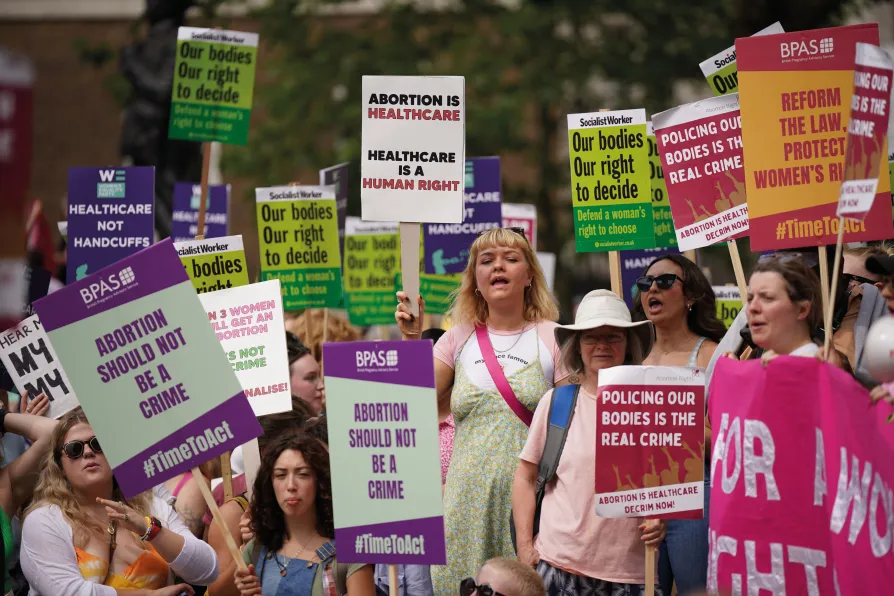This weekend, the NEU holds a special conference to debate changing its approach to organising teaching assistants, which a 2017 TUC agreement forbids. General secretary DANIEL KEBEDE outlines the choices before delegates
Police guidelines suggesting home searches and digital checks for women who experience pregnancy loss under suspicion of having broken the outdated 1967 Abortion Act have sparked uproar, writes PEOPLES’ HEALTH DISPATCH

 ABORTION RIGHTS: Women’s rights campaigners in Westminster, London, after taking part in a march from the Royal Courts of Justice calling for the full decriminalisation of abortion, June 17 2023
ABORTION RIGHTS: Women’s rights campaigners in Westminster, London, after taking part in a march from the Royal Courts of Justice calling for the full decriminalisation of abortion, June 17 2023
HEALTH WORKERS and reproductive health organisations in Britain have been taken aback by updates to police guidelines that suggest checking digital devices and searching the homes of women who experience unexpected pregnancy loss.
In what appears to have been a process carried out without consultation with health professionals or women’s rights organisations, police organisations are apparently pursuing a course of action that exposes women already in situations of high emotional distress to further hardship, causing long-lasting mental health effects.
“This is dystopian,” Doctors for Choice stated in response. “This guidance doesn’t protect anyone — it polices bodies, invades privacy and violates dignity.”
The document recommends searching homes for “packaging, documentation and empty medication blisters,” particularly for substances used in medical abortion such as mifepristone and misoprostol — the latter also used under certain brand names for treating ulcers — in cases where investigators suspect women have violated the 1967 Abortion Act. Searching through household waste is mentioned as an alternative to accessing formal medical records when health professionals treating the woman are deemed “unco-operative.”
Extensive searches of digital data are also encouraged. “Internet search history, digital communications with third parties, and health apps such as menstrual cycle and fertility trackers may all provide information to help investigators establish a woman’s knowledge and intention in relation to the pregnancy,” the National Police Chiefs Council (NPCC) states in the guidelines.
The NPCC’s advice reflects a broader trend toward the criminalisation and persecution of women who undergo abortions or experience miscarriage and stillbirth in Britain. Over the past three years, at least six women have faced trial for ending a pregnancy “outside the terms of the 1967 Abortion Act,” the British Pregnancy Advisory Service warned, and many more are routinely subjected to long, stressful police investigations.
A coalition of professional associations and trade unions recently summarised the impact this has on women. “Several women and girls have been held in custody following a traumatic pregnancy loss, with one describing how police guarded her on the ward following surgery, not even being allowed to close the door of the toilet when a male officer was on duty,” the associations said.
“Bail conditions have included the order for a young woman not to have direct or indirect contact with any children under the age of five, effectively barring her from many career options or family gatherings.”
Advocates emphasise that the current situation stems from the legal framework regulating abortion in England and Wales, where termination of pregnancy is decriminalised only under certain circumstances. Outside those conditions, the act remains a criminal offence under an 1861 law and can carry a life sentence.
Calls to reform the legal framework have circulated for years but have yet to result in substantive change in parts of the country. In mid-May this year, a coalition of medical bodies and abortion care providers issued a renewed call to fully decriminalise abortion in Britain, emphasising the importance of respecting women’s basic rights — particularly for those in vulnerable situations.
“Abortion that happens outside the current law generally involves very vulnerable women — including those facing domestic abuse, mental health challenges, or barriers to accessing NHS care,” said Dr Ranee Thakar, President of the Royal College of Obstetricians and Gynaecologists.
“Abortion is an essential form of healthcare and should be subject to regulatory and professional standards like other medical procedures, not criminal sanctions,” Dr Thakar added.
People’s Health Dispatch is a fortnightly bulletin published by the People’s Health Movement and People’s Dispatch — Peoplesdispatch.org.














